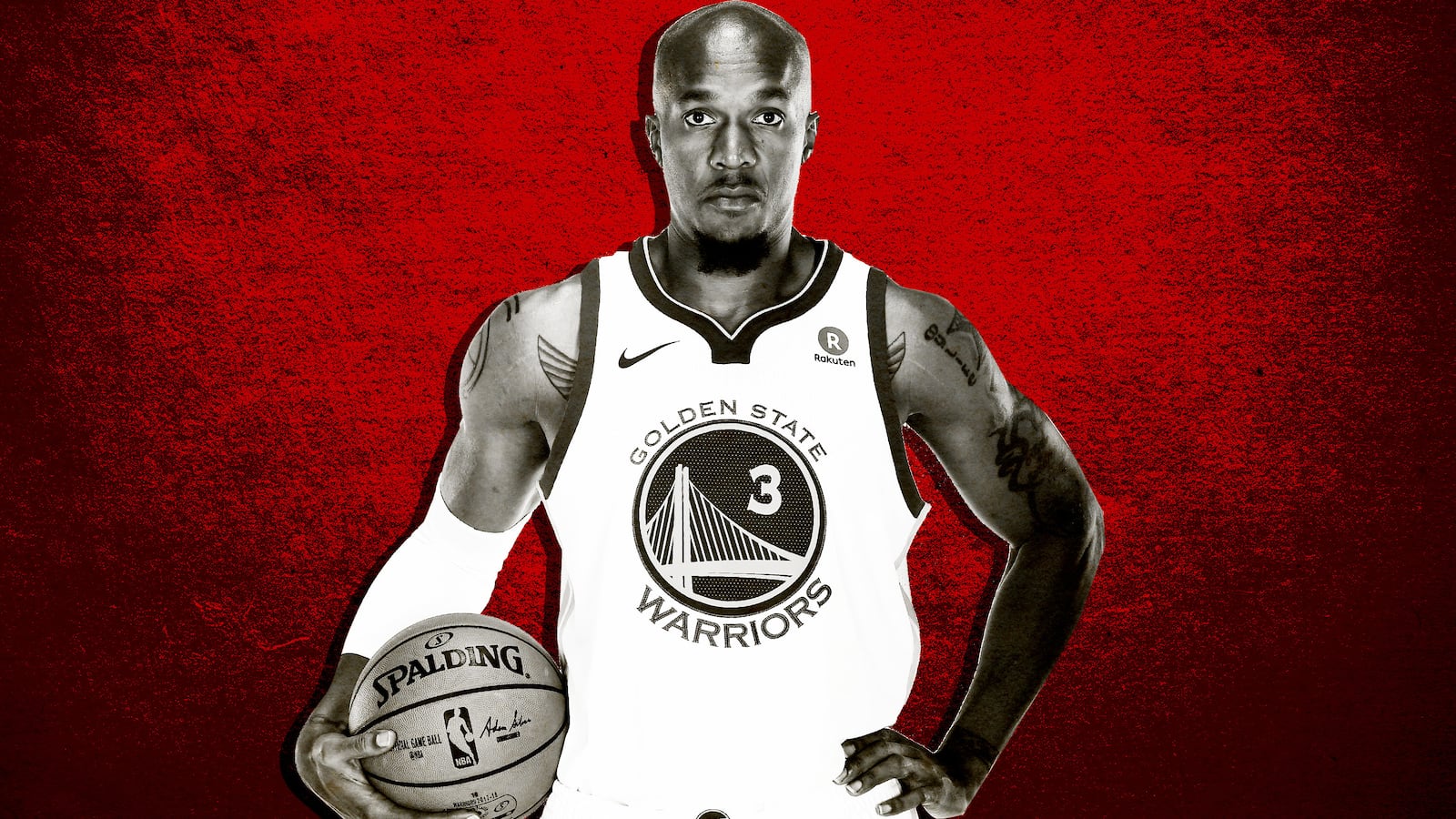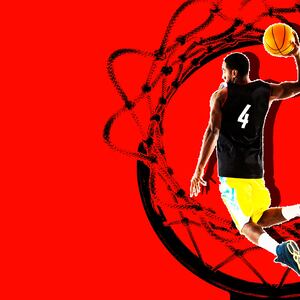It was either David West’s first or second season in professional basketball, but he can’t quite pin it down. No matter. The off-court moment will remain with him for the rest of his life.
At some point in 2004, during West’s early years with the New Orleans Hornets, owner George Shinn gathered the entire roster for a little chat. The topic of conversation: the national anthem, of course. Shinn announced that while NBA rules stipulated that all players were required to stand at rigid attention while refraining from fidgeting or doing anything that might prove distracting while the anthem played, they still weren’t expressing enough patriotic fervor. Not in his mind, that is.
Instead, Shinn proclaimed, all of the Hornets would now have to place a hand over their hearts as well. Why? Because “I want you to do it and this country has been good to you,” West recalled Shinn saying.
The two-time All-Star, who retired from the NBA at the end of the 2017-18 season, and I are huddled in a small conference room neatly slotted into the first floor of a Hell’s Kitchen hotel. Though Shinn’s jingoistic decree was delivered some 15 years ago, “I’ll never forget that day,” said West. What’s more, he’s still stunned that “no one else was as offended as I was.”
So he calmly raised his hand and told Shinn he wouldn’t comply, even though a teammate was silently jabbing him in the leg, trying to get him to stop talking. “I don’t believe that me being a citizen, I don't believe that me being someone in the NBA, that that should be a requirement for me,” he recalled thinking at the time. “Especially considering the political moment that we’re in, we were going to war in Iraq… We have a right to voice our opinions, particularly when we object to certain things.”
Before Hurricane Katrina struck, West and his teammates had been working in the community, and the conditions they witnessed—school cafeterias with dirt floors, textbooks hopelessly out-of-date—were stark reminders of why he refused to bend to Shinn’s will. “All you have to do is venture 20 miles outside of New Orleans and you see abject poverty...” he said, his voice trailing off and shaking his head. “The country’s been good to us?” (Shinn passed away in 2013. Last year, Stephen Curry’s mother said Shinn had told her in the late 1980s he disliked the idea of players on his team engaging in interracial relationships.)
From that day forward, West staged his own personal anthem statement. Don’t call it a protest—West specifically says it’s not—but while “The Star Spangled Banner” rattled around every corner of NBA arenas, West always stood at the end of the line and few feet back from the rest of his teammates in quiet contemplation. Few people ever took notice, which is exactly how West wanted it. The NBA—which de facto blackballed players like Craig Hodges and Mahmoud Abdul-Rauf, the latter specifically because he first skipped then bowed his head in prayer during the anthem—never uttered a peep.
“I’m always gonna be there at the end,” said West. “I’m always gonna take this thing in context and not allow this entire environment to take my focus away from what's going on in the real world.”
Throughout the course of West’s 15-year career, which ended on two championship-winning Golden State Warriors squads, he’s done exactly that. A voracious student of African-American history, West has never refrained from speaking out about racial profiling, the dehumanization of African Americans, and police brutality. Teammates seeking information about the current political morass would often seek out his counsel, and he’s been a consistently outspoken and defiant critic of President Trump, but with an eye towards the larger historical context, even if that meant shattering a few illusions along the way.
When Trump reportedly went on a bigoted rant about immigrants from Africa and Haiti, saying they came from “shithole countries,” West tweeted out a screenshot from his copy of A Short Account of the Destruction of the Indies to his 260,000-plus followers.
Similarly, after Donald Sterling, the then-Los Angeles Clippers owner, was caught on tape slinging racist dreck, West wasn’t willing to portray Sterling’s bigotry as an aberration. “[Being an athlete or entertainer], people can come cheer for you but as soon as the game is over, they are who they are and they think how they think, they feel how they feel,” West said, per the Indianapolis Star. “There have been folks before [Sterling] and there have been a ton of them after him.”
For West, despite progress that has been achieved, overcoming “this original sin, the stain of racism,” in America, he said, “we're always being pulled back into what this nation is most comfortable with,” namely, institutionalized and systemic racism. Sadly, West is certain the next two years promise more of the same.
“I'm dreading this presidential cycle coming up because we're literally going to go right back, with this Southern Strategy bullshit, the fearmongering, the stereotyping,” he said.
In addition to the charitable efforts of his foundation, the West Group, his investments in renewable energy, and time spent holding basketball clinics and rebuilding courts in locations as far-flung as Ghana, West is focusing on what’s been to-date a seemingly impossible goal: paying college athletes for their labor. In November, he was named chief operating officer of the Historical Basketball League (HBL), a 12-team professional league scheduled to kick off in the summer of 2020 games.
The HBL would provide athletes with scholarships to any educational institution, whether it is a four-year university, junior college or even a vocational school,within the vicinity of his team. (The HBL’s nonprofit application is currently being processed.) Contra the difficulties NCAA athletes face in focusing on their education, the HBL’s goal is to create a robust, competitive league that both preps athletes for a career in basketball while giving them time and space to earn a degree.
Salaries would range between $50,000 and $150,000 per season, and contractual arrangements with agents and shoe companies would not only be permitted, but encouraged. If successful, the HBL would provide a real alternative to the NCAA.
Ricky Volante, a lawyer, co-founder, and chief executive officer of the HBL, couldn’t be more thrilled with West’s contributions. “David has brought legitimacy to what we’re trying to accomplish from a basketball perspective,” he said via email. “He’s one of the most respected players to go through the NBA in a long time, and that’s translated to great success off the court.”
While West has nothing but fond memories of his time at Xavier University in Ohio, and though he’d earned a Pell Grant, it wasn’t always enough.
“There were times where my mom and dad had to get money from the church so I could have a few bucks in my pocket so I could be able to go to the movies or grab something to eat,” he said.
Bringing about an end to the NCAA’s (legal) wage suppression is still a ways away, even if the groaning hypocrisy was brought into focus last month when Zion Williamson, Duke’s star forward and a lock to go first overall in the 2019 NBA draft, rolled his ankle, blasting his Nikes to smithereens in the process. West took out his phone and showed me a tweet by the Action Network’s business reporter and resident brand-bot, Darren Rovell, claiming that when Williamson made his triumphant return, the closeups on ESPN of his refurbished sneakers earned Nike over $340,000 in free advertising during the first half alone.
Still, West believes public sentiment will eventually turn against amateurism. But again, there’s a racial barrier to be overcome. When it comes to revenue-generating college sports—football and men’s basketball—the vast majority of athletes are African Americans, many of whom come from “underserved and a lot of times underprivileged backgrounds,” West noted. Polls have consistently shown that a majority of people of color want amateurism abolished; white people tend to differ. For those backing the NCAA, the belief still holds that African-American athletes are somehow being greedy by demanding that some portion of billions they’ve generated in income for the NCAA ($1.1 billion in 2017 alone) be rightly distributed to the laborers who made that windfall possible.
“I just think that kids deserve options, deserve choices,” West said. “So that’s what we’re trying to do: create one that’s a viable option for them.”
West counts himself fortunate that at the end of his career, he was able to play for coaches like Steve Kerr and Gregg Popovich. Both men, in addition to their near-endless knowledge of the game, fostered an atmosphere of independent thought and intellectual curiosity, even if the subject had nothing to do with basketball. In October 2015 during his first season with the San Antonio Spurs, the team was waiting for practice to start, and out of nowhere Popovich bellowed, “Why the fuck are we still celebrating this holiday?” It took a minute for West to realize which holiday Popovich was referring to. Then it hit him: Columbus Day.
In lieu of running through drills, the entire team delved into what the holiday meant, including assistant coach Ettore Messina, an Italian coaching legend who’d joined the Spurs in 2014. According to West, Messina confessed that despite the reverence bestowed on Christopher Columbus in his native country, he was “ashamed,” West said. (Popovich and Messina did not respond to an emailed request for comment prior to publication.) And while he had plenty of thoughts he would have liked to offer, West was gobsmacked, amazed that this kind of dialogue could and should supersede whatever on-court activities Popovich had originally planned for the day. So West stood there, taking it all in.
Those lessons, the sense of trust and mutual respect, are being carried forward. In North Carolina, West runs a basketball program and one by one, game by game, he’s working to overcome deep-seated prejudices. He tells me the story of a white father of an eighth grader. The parent was worried about bringing his son into a predominantly-black community and neighborhood. His (irrational) fears soon dissipated.
“I’m gonna tell you guys something. Folks told me not to come over here,” West recalled the father saying. “They told me not to come over here. Told me it was too dangerous. Told me I’d put my family in danger by coming over here. I want to tell you guys I’m glad I didn’t listen.”
“That,” West said, “is where we make the change. That’s where we shift.”


